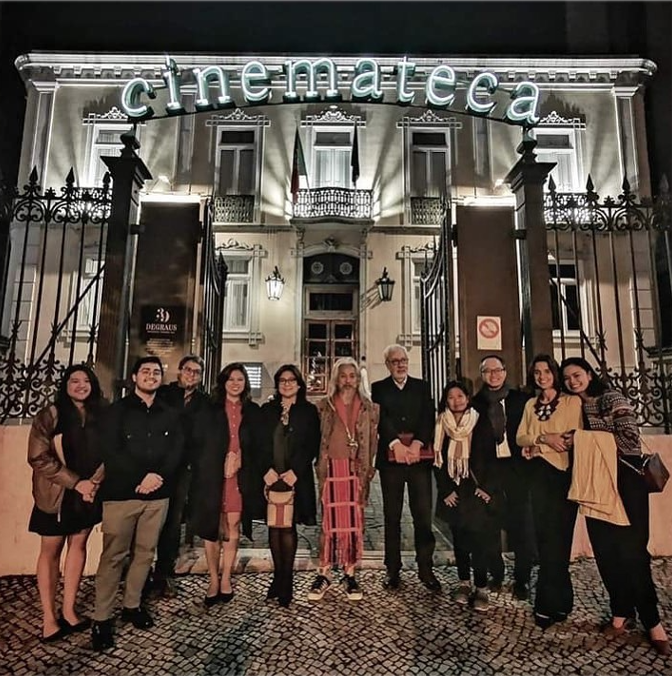
(From Left to Right) Ms. Marica Uchida and Mr. Miguel Feria of Indigo Research, Kidlat Gottlieb Kalayaan, FDCP Chairperson and CEO Liza Diño-Seguerra, Philippine Ambassador to Portugal Celia Anna Feria, Kidlat Tahimik, Philippine National Artist for Film, Cinemateca Portuguesa Director José Manuel Costa, Ms. Shumate Royo of DevCon, PTIC Director and Commercial Attaché Froilan Emil D. Pamintuan, Ms. Luisa Lucas, and Ms. Michelle Reyes, Cultural Officer of the Philippine Embassy in Lisbon pose in the façade of the Cinemateca Portuguesa-Museu do Cinema prior to the film screening of Raya Martin’s “Independencia”. (photo courtesy by Ice Seguerra)
08 November 2019, LISBON - From November 8 to November 30, Sine, Cinema das Filipinas – Nos Cem Anos do Cinema Filipino (Philippine Cinema – In the Hundred Years of Filipino Cinema) will feature 15 classic films at the Cinemateca Portuguesa - Museu do Cinema in Lisbon, Portugal.
The film screenings are part of the Philippine Embassy’s Cinema Retrospective and its vigorous efforts of the Philippine Embassy to forge stronger cultural and people-to-people ties between the Philippines and Portugal through the medium of films.
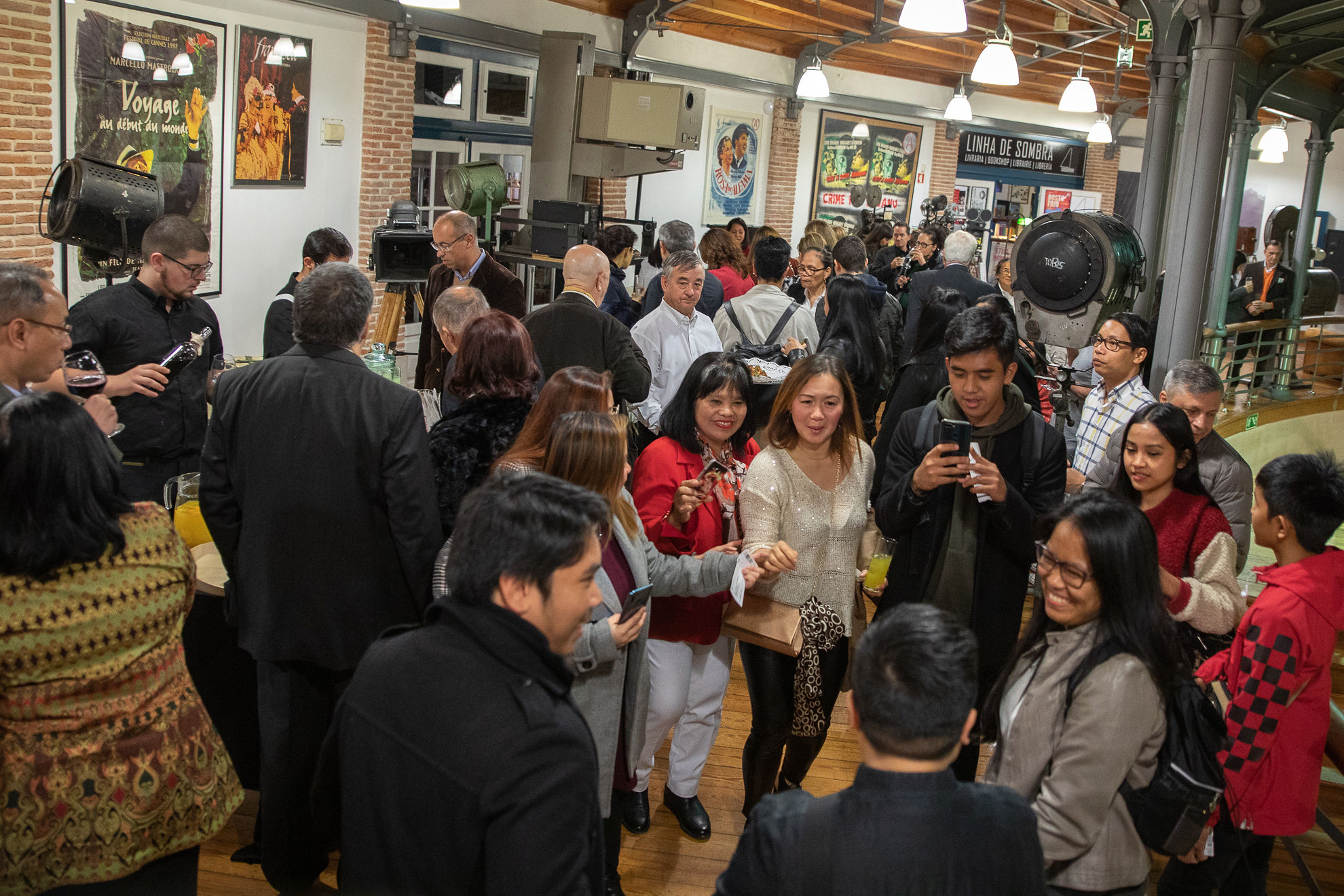
Guests enjoy a Filipino cocktail reception at the Cinema Portuguesa prior to the screening of “Independencia”
Cinema das Filipinas was officially launched on 08 November at Cinemateca Portuguesa – Museu do Cinema with a Filipino cocktail reception and the screening of Raya Martin’s “Independencia” (2009).
During the opening program, Cinemateca Portuguesa Director José Manuel Costa gave the welcoming remarks and said “We now have the opportunity to provide Portuguese viewers with a journey on Philippine cinema, which is only known in Europe through a few auteurs, such as Filipino director Lino Brocka, ‘discovered’ in the 1980s, and contemporary film makers such as Directors Brillante Mendoza, Lav Diaz, or Raya Martin. Director Costa acknowledged that Filipino cinematography started early dating back to the 1910s and Filipinos have always been part of the world's most avid cinema audiences.” He further noted that the films that will be presented in this cycle, made between 1950 and 2015, have been divided into three major chapters, which illustrate these three great periods of Filipino cinema.
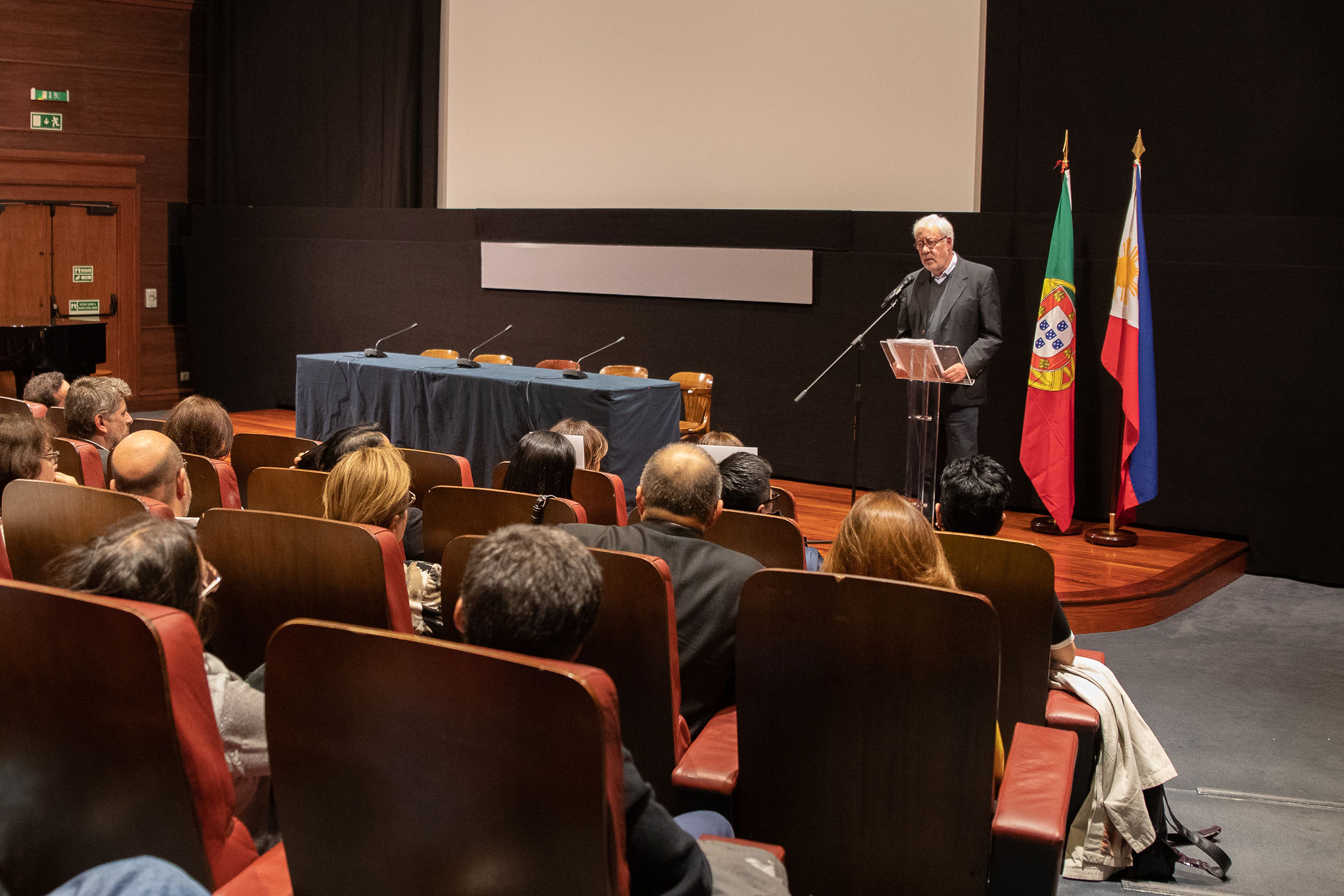
Cinemateca Portuguesa Director José Manuel Costa welcomes the audience to the first screening of the Philippine Cinema Retrospective in Portugal.
After Director Costa’s remarks, FDCP Chairperson and CEO Liza Diño-Seguerra thanked the Philippine Embassy for taking the lead in organizing a Philippine Cinema Retrospective in Portugal. “I'm very happy that Philippine Embassy in Portugal sees cinema as a way to promote our stories and our people and our way of life. We cannot just have one narrative out there about the Philippines.” She further explained that “through a well-curated government-led Filipino film festival, we take charge of the narratives we want to share with the world. It's all about collaboration and seeing the bigger picture,” said FDCP Chairperson and CEO Diño-Seguerra.
This followed with remarks from the Philippine Ambassador to Portugal Celia Anna M. Feria who thanked FDCP and Cinemateca Portuguesa for supporting the Embassy’s cultural initiative so that Filipinos in Portugal and the Portuguese alike can discover and appreciate Philippine cinema at its best. Ambassador Feria remarked that cinema viewers of the Philippine Cinema Retrospective will be able to enjoy 3 generations of Philippine cinema which are the 1st and 2nd Golden Ages of Cinema and the 3rd being the emergence of Philippine Independent films. The Ambassador also mentioned the enormous support of House Deputy Speaker Loren Legarda for her contribution to the Philippine Embassy’s cultural diplomacy activities in Portugal.
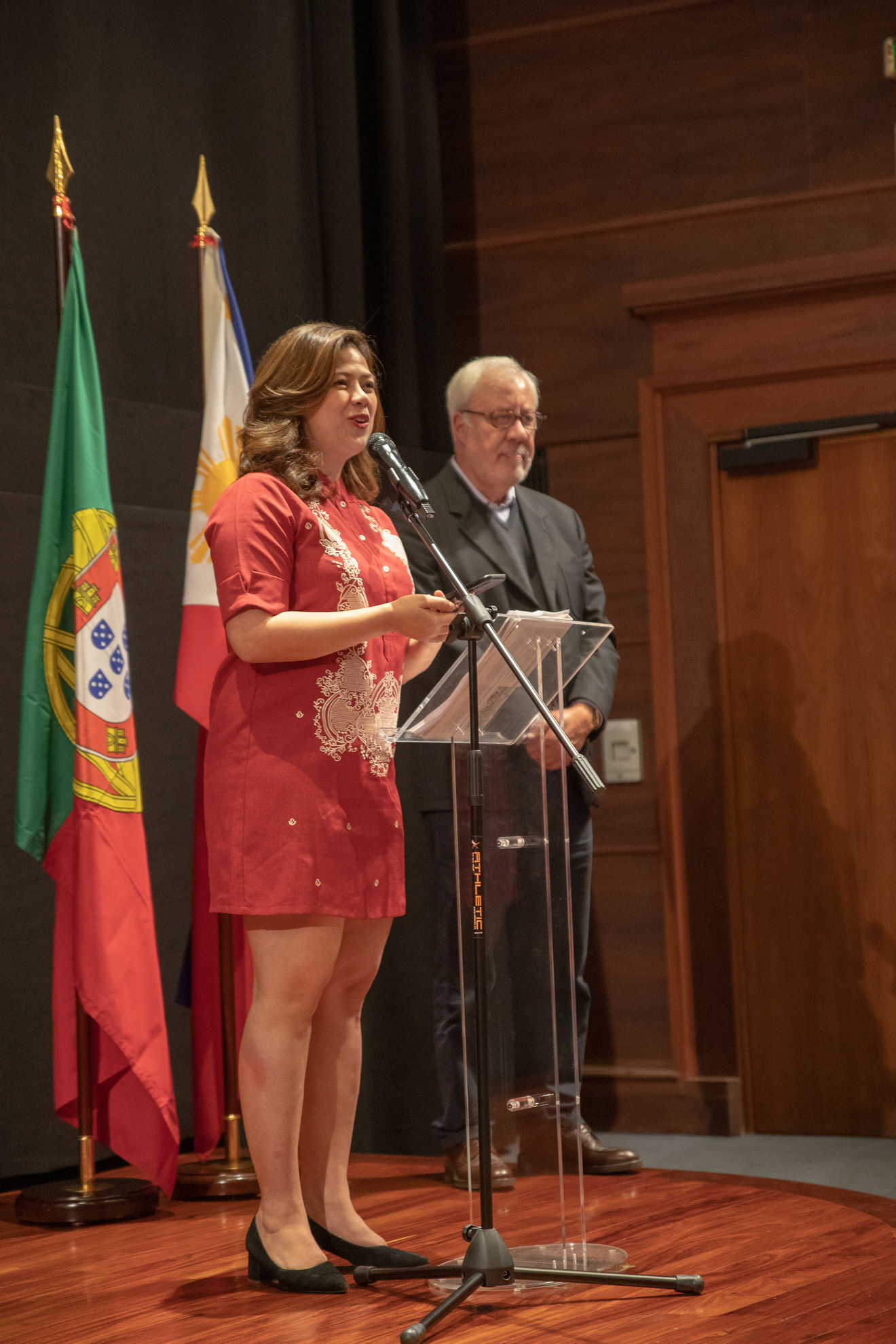
FDCP Chairperson and CEO Liza Diño-Seguerra giving her remarks on the Philippine Cinema Retrospective in Portugal (standing left) while Cinemateca Portuguesa Director José Manuel Costa looks on (standing right)

Philippine Ambassador to Portugal Celia Anna M. Feria (standing left) expresses her appreciation to FDCP and Cinema Portuguesa for their support on the Philippine Embassy’s cultural diplomacy initiative to promote Philippine Cinema in Portugal, while Director José Manuel Costa looks on (standing right)
Present during the screening of Raya Martin’s “Independencia” were Kidlat Tahimik, Philippine National Artist for Film, Ice Seguerra, Filipino actor, singer-songwriter and guitarist, members of the Diplomatic Corps, Portuguese government officials, members of the Filipino community, and local film enthusiasts.
The lineup of Cinema das Filipinas – Nos Cem Anos do Cinema Filipino comprises classics and modern favorites such as "Genghis Khan," "Himala," “Balikbayan #1: Memories of Overdevelopment Redux VI,” “Serbis” and "Independencia." All films will be screened in high definition digital formats except for “Serbis” and “Independencia,” which will be shown in 35mm.
The Philippine Cinema Retrospective in Portugal promises to showcase a wide range of Philippine Cinema works featuring 3 generations of Philippine Cinema. The 1st Golden Age features two masterpieces: the 1950 production “Genghis Khan” by Lou Salvador (signed by Manuel Conde) and the 1961 film “Noli Me Tangere” by Gerardo de Leon. The Second Golden Age chapter has seven movies: “Maynila sa mga Kuko ng Liwanag” (1975) by Lino Brocka, “Ganito Kami Noon… Paano Kayo Ngayon?” (1976) by Eddie Romero, “Insiang” (1976) by Lino Brocka, “Mababangong Bangungot” (1977) by Kidlat Tahimik, “Himala” (1982) by Ishmael Bernal, “Oro, Plata, Mata” (1982) by Peque Gallaga, and “Karnal” (1983) by Marilou Diaz-Abaya and Maynila sa mga Kuko ng Liwanag” (1975).
Completing the roster of the Philippine Cinema Retrospective are six film productions which fall under The Rise of Independent Movies. Raya Martin’s “Independencia” (2009), Lav Diaz’s “Ebolusyon ng Isang Pamilyang Pilipino” (2004), Brillante Mendoza’s “Serbis” (2008), Pepe Diokno’s “Above the Clouds” (2014), Milo Sogueco’s “Mariquina” (2014), and Kidlat Tahimik’s “Balikbayan #1: Memories of Overdevelopment Redux VI” (1979/2017).“Mariquina” (2014), which will be shown on November 26 and 30, is the closing film of the Philippine Cinema Retrospective in Lisbon. This Philippine Cinema Retrospective is made possible through the partnership among the Film Development Council of the Philippines (FDCP), its Portuguese counterpart, Cinemateca Portuguesa - Museu do Cinema and the Philippine Embassy in Portugal.

Kidlat Tahimik, Philippine National Artist for Film (fifth from right) and other guests at Cinema Portuguesa for the first screening of the Philippine Cinema Retrospective in Portugal
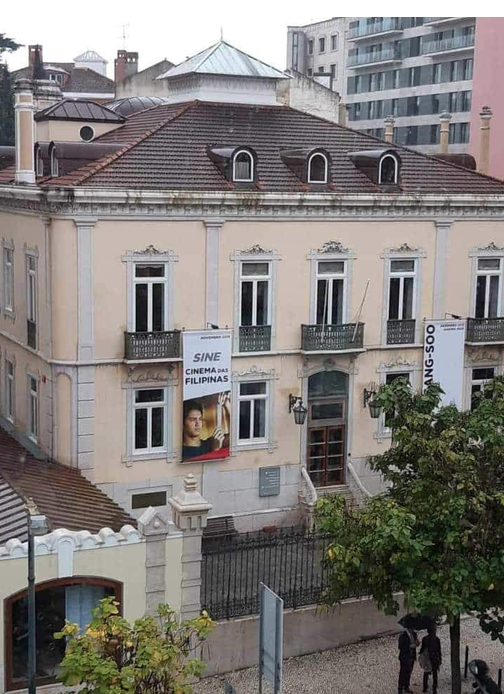
The poster of “Above the Clouds” (2014) at Cinemateca Portuguesa in Lisbon Portugal (photo courtesy by Michelle Reyes)

